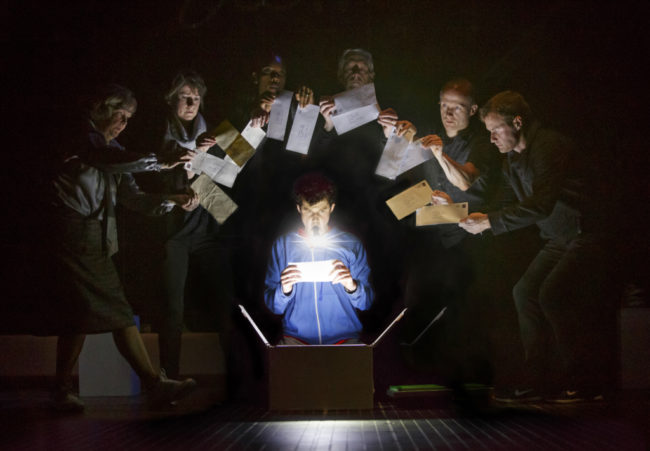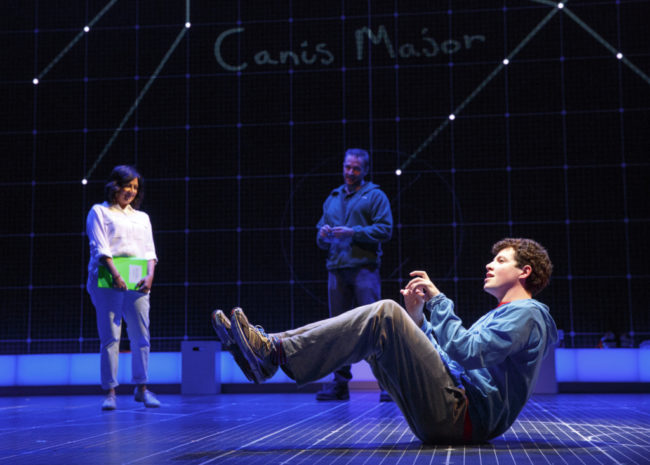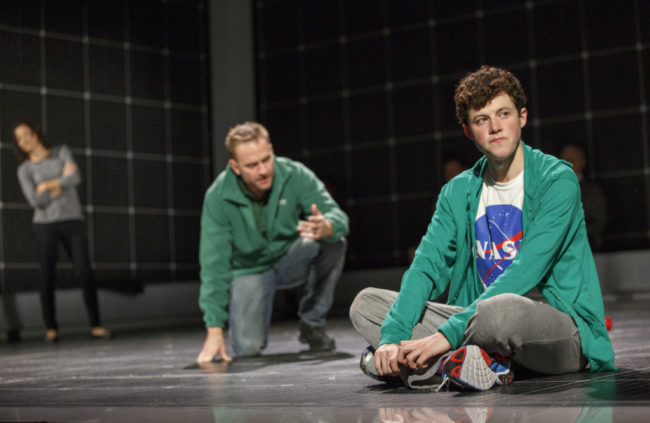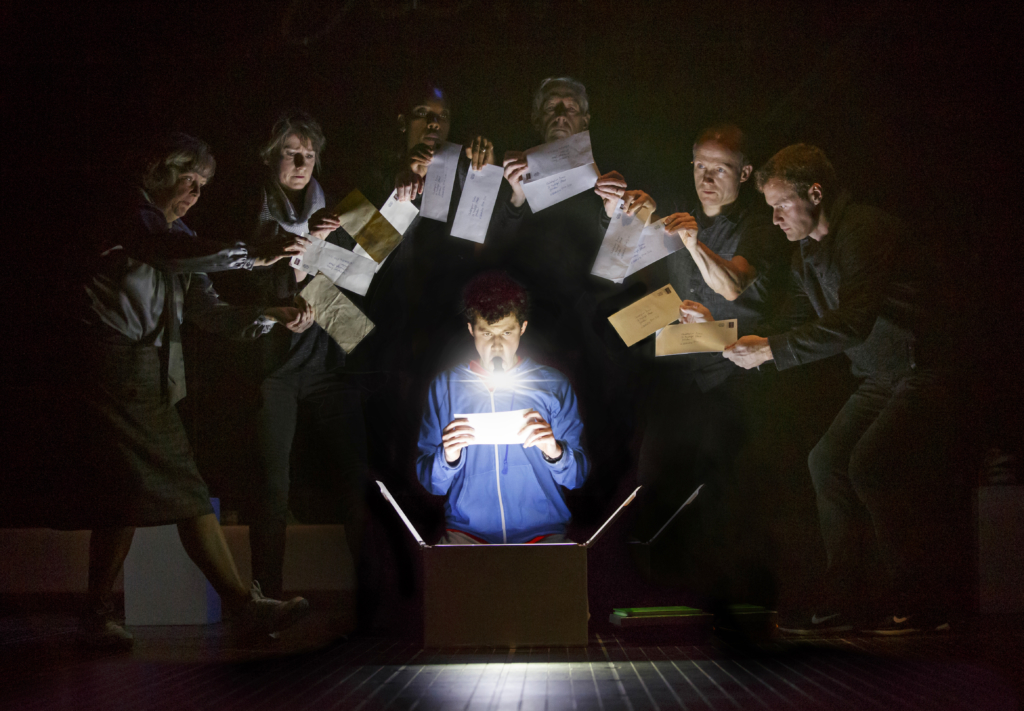His name is Christopher John Francis Boone. He knows all the countries of the world and their capital cities. He notices everything. But most importantly he is now appearing on the Opera House stage of The John F. Kennedy Center for Performing Arts as the 2016/2017 theatrical season gets well underway. Fresh from Broadway, the national tour of The Curious Incident of the Dog in the Night-Time makes its regional debut at The Kennedy Center and mesmerizes the audience for the evening with its spellbinding wonder and its heart-wrenching emotional journey. Directed by Marianne Elliott, this wondrously strange yet intimately beautiful new play by Simon Stephens based on the novel by Mark Haddon, will captivate the audience every step of the way between its stunning emotional story and the perfectly synchronized chaos of light and sound that evolve around the tale as it unwinds.

A gridded box hardly seems impressive upon first glance, leaving the audience wondering what Scenic Designer Bunny Christie was thinking when set to the task of creating the framework for such a powerful play. But once Lighting Designer Paule Constable and Video Designer Finn Ross set their visions into motion, the gridded box becomes so much more that it’s dizzying. A whirl of chaos, capturing the very essence of the inside of Christopher’s mind, is perpetually in motion on the floor, the walls, and all around the space. Constable’s lighting is wild, simply put, and aligned with perfect synchronicity to the movement happening on the stage as well as the frenetic pulse of Adrian Sutton’s music; even when this music is still and tranquil there are reverberations of emotional crescendos growing within it.
The show is visually spectacular; there are lights which blink, images that swirl and gather, and a constant thrum of movement that possesses and informs Constable and Ross’ design work. These pulsations of light and imageries, intertwined with Sutton’s music and the Sound Design of Ian Dickinson (for Autograph), becomes integral characters of their own, breathing life into each moment and augmenting the beauty of what’s happening around the story. This amalgamation of visual and aural stimuli at times becomes overwhelming, bordering on sensory overload, which is the perfect representation of the cacophony of experiences erupting simultaneously inside of Christopher’s mind.
In addition to sound and light playing as characters in the play, there is a dizzying and indescribably beautiful sense of movement laid over the piece, conducted by Choreographers Scott Graham & Steven Hoggett (for Frantic Assembly.) At times mechanical and at other times like fluid, these sequences of meticulously plotted movement are striking and add rich complexity to the show’s existence. Hoggett and Graham use the ensemble presently in the moment, lifting Christopher and pulling him through the chaos that implodes around him and instances like these are some of the most jarring and yet awestriking that occur in the play.
The entire show bursts with vibrant life and unsettling moments of harrowing emotional confession under the astute direction of Marianne Elliott. The way that the pieces of the puzzle fit together and cycle into one another make for a practically perfect experience. Elliott succinctly captures the height of emotional catharsis, readily expresses disarming moments that paralyze the audience as certain details are revealed, and immerses theatergoers in the world of Christopher’s internal thought process so thoroughly that our heartstrings are beyond tugged when the reality of the situation grows to an intensity which the protagonist simply cannot handle. A remarkable job in handling the production as a whole, it’s Elliott’s visionary approach to the piece that makes the work extraordinary.

Adam Langdon Joan Marcus
Working together as a movement-driven ensemble, the players of The Curious Incident of the Dog in the Night-Time find themselves taking on various roles throughout. More notable character work is witnessed from (at this performance) Josephine Hall, taking on the bitter Mrs. Shears, and the absurdly humorous Mrs. Gascoyne, Christopher’s headmistress, who with just a slowed utterance or two of a word here and there has the audience in stitches with her shenanigans. Equally humorous character work comes out of Geoffrey Wade, who takes on the roles of the Station Policeman and Guard, among others, and makes short work of the quick jokes about being too old to be a policeman. Amelia White, who is most noted for her delicate and well-intentioned character Mrs. Alexander, has a liveliness to her as well, which warrants noting.
There is a calming presence that accompanies Siobhan (Maria Elena Ramirez) wherever she goes, whether its physically encountering Christopher or echoing as the voice inside his mind. Often underscored by tranquil and soothing sounds, Ramirez’ work as Siobhan is a balm to the chaffing exterior world that abrasively encounters Christopher at every turn. The conversation shared with him during the star-encounter in London is deeply moving, touching the soul on a sweet and earnest level. Her presence of mind when in active scenes— like the classroom— is profound and differs greatly from the narrative tone with which she uses to read his story.
Judy (Felicity Jones Latta) radiates a warm glow from her very core on her first encounters, which are perceived to be memory. Latta possesses as glamorous quality about her being— the way she physically carries the character in the seaside holiday recollection being sublime— as well as in her simple way of speaking. Her narrative overtones in the letters are striking and her in-person encounters are divine. There is a moment in the second act where Latta’s character encounters Christopher and the interaction is so deeply moving that just watching it sends tingles down the spine.
Almost the exact opposite of Latta’s portrayal of Judy, is Gene Gillette’s portrayal of Ed. There is a heaviness that is ever present in him, the way he talks to and interacts with Christopher feeling leaden at times. The gruff exterior that Gillette presents often gives way to desperate confusion, as it is clear that the character of Ed loves his son but he loves him the best that he can. An emotionally disarming moment comes flying out of Gillette near the end of the first act and it is strikingly profound, enough to give the audience pause and reevaluate exactly where he’s coming from with his character’s overall trajectory.

Adam Langdon Joan Marcus
The play is an emotional war and the battlefield becomes the minds, hearts, and souls of the audience as Adam Langdon takes on the role of Christopher John Francis Boone. Exactingly articulate with a powerful mastery on the speech mannerisms of the character, Langdon delivers a powerful performance. What exactly it is that Christopher is coping with is never clearly expressed by the author of either the book or the play (though many have speculated and presented conjecture that it is a form of autism, quite considerably Asperger’s Syndrome) but Langdon does an exceptional job of expressing this limitation in the way that he speaks, moves, and interacts with others. It’s harrowing at times to watch the chaos in his mind overwhelm him to the point of a panic attack. Evocative and viscerally invested, Langdon carries the show through to its inspiring yet bittersweet conclusion and keep the audience captivated on the edge of their seats every step of the way.
I find people confusing; this is a great sentiment that Christopher echoes throughout the performance. It too shall be a great sentiment that I echo if people do not procure tickets to see The Curious Incident of the Dog in the Night-Time, as it is a tremendously spectacular production and most certainly one not to be missed.
Running Time: 2 hours and 30 minutes with one intermission
The Curious Incident of the Dog in the Night-Time plays through October 23, 2016 on the Opera House Stage of The John F. Kennedy Center for Performing Arts— 2700 F Street NW in Washington, DC. For tickets call the box office at (202) 467-4600 or purchase them online.
To read the Curious Interview with Gene Gillette, click here.

